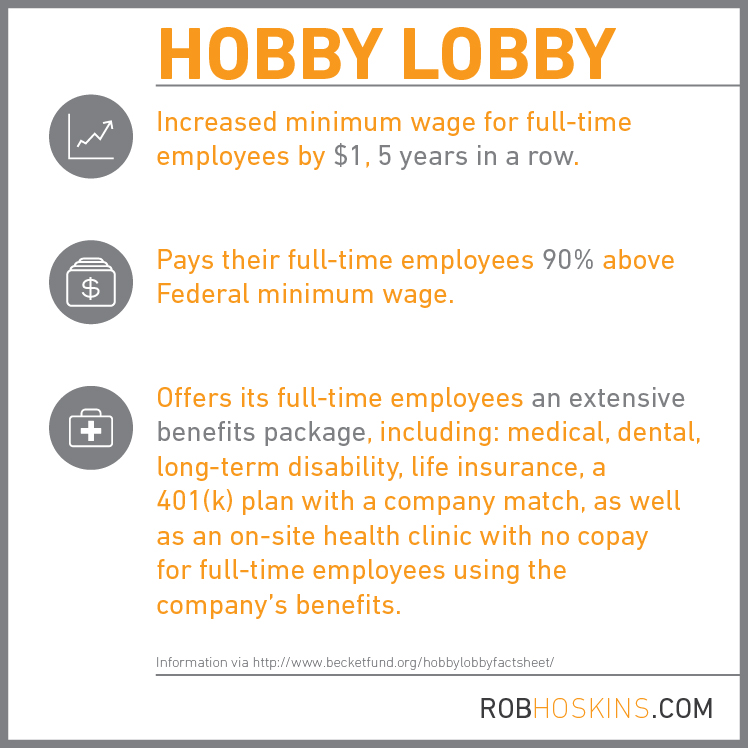There’s a lot to celebrate in the Hobby Lobby Supreme Court decision handed down today. However, there’s also a lot to chew on.
As a friend of the Green family, I’m elated that the heavy burden they’ve been carrying for many long months has been lifted and they can proceed with their lives, running their businesses according to their values and beliefs.
As an American I’m relieved that this family was not forced to choose between abandoning their religious convictions or abandoning their business and livelihood. No matter your stance on abortion, the “deeply disturbing” Hillary Clinton statement or other Leftist’s reactions stirring up nasty debate after today’s ruling, I think even the dissenting voices on the Supreme Court acknowledged that this case was really about religious liberties.
In her scathing minority opposition to the court’s decision, Ruth Bader Ginsburg said the issue was whether or not corporations had the right to make ‘religious decisions’.
“The court’s expansive notion of corporate personhood,” Justice Ginsburg wrote, “invites for-profit entities to seek religion-based exemptions from regulations they deem offensive to their faiths.”[1]
Although it’s true that people aren’t corporations, you can’t do business without a corporate structure. Hobby Lobby is not a public corporation; it is a privately held family business.
“The court forgets that religious organizations exist to serve a community of believers,” she wrote. “For-profit corporations do not fit that bill.”[2]
In other words, faith convictions have no place in public life. This is exactly what was unconscionable to the Green family; the notion that they would be forced to bifurcate between their “sacred” beliefs and their “secular” lives. For them there is no divide.
Should the dissenting justices have had one more vote, it would have given the government power to enforce their convictions on for-profit corporations, public or private. The thought that the government can force us to abide by their morality in our vocational or public life should have scared to death any lover of freedom or liberty. (Side note: I am surprised that the ACLU wasn’t the first in line to protect the rights of a personal family business.)
No one is “forced” to work for Hobby Lobby. But if one freely chooses to work there, they might have to “suffer” being paid generously above the minimum wage ($15/hour) by an employer that exorbitantly supersedes industry standards, even going the extra mile to provide insurance that included birth control prior to the Obamacare mandate[3]. This exceptionalism is exactly why employees clamor to be hired there. They understand when they take a job that they are not choosing to work for a public corporation of shareholders or a strictly regulated government agency, but instead that they are entering the employ of individuals who unapologetically live by faith as the final arbitrator on issues of morality.
In our increasingly pluralist society, people of faith in the United States must be aware of the shifting sand beneath us. In an interview with Time magazine, the author cited my mention of James Davidson Hunter’s useful paradigm for Christian cultural engagement, identifying three distinct streams in the long history of American evangelicals:
- “purity from” the majority culture
- “defensive against”
- “relevance to” it
In this article, an alternative category was proposed to define the Green family: “faithful presence within.”
The Greens have exemplified this most daring commitment to “faithful presence within” in taking their courageous stand. They didn’t capitulate their convictions for accommodation or convenience. But like the prophet Daniel and his brave young companions, they live public lives without compromising personal faith. When opposition comes, they’re ready to face the lions or the fires. They realize that they could have been delivered or just as easily defeated in the Supreme Court. Even now they are being judged in the court of public opinion, but that is not the criteria for the decisions they make as a family. They firmly believe they cannot lose if their trust is in God and His sovereign rule over their lives.
I’m happy the Greens have a reprieve from the attacks they will inevitably face in our increasingly pagan and secular society. We mustn’t be under any false illusions that the tide has shifted. Followers of Christ and His Word have always been called to be a peculiar people; living “in the world but not of the world.”
This doesn’t mean we are to disengage from political, social or cultural life, instead it means we must be careful not to invest all of our good faith into an illusion of a bygone America we once knew, with a collective Judeo-Christian ethos and conscience. Should we hope, vote and pray for a renewal of Biblical reformation and restoration, maybe we can return to that safer bygone era. But in the here and now we—like the Greens—must be prepared to take a stand.
You and I may not own a billion dollar family business, but as people of faith and conviction are we prepared to be a faithful presence when faced with a decision of conscience that jeopardizes our peace, comfort and freedom?
While we are preparing for challenges that may or may not come, we must avoid triumphalism and understand that we live in a world that does not adhere to our convictions. Our humility in victory should speak louder than our outrage in defeat.
You might also enjoy:
- Creating a COSTCO culture in a ministry setting
- Tips to build a Leadership Dream Team
- How to WIN with a leadership transition plan
- The future of fundraising: a lesson from Kickstarter
- A Courageous paradigm shift





